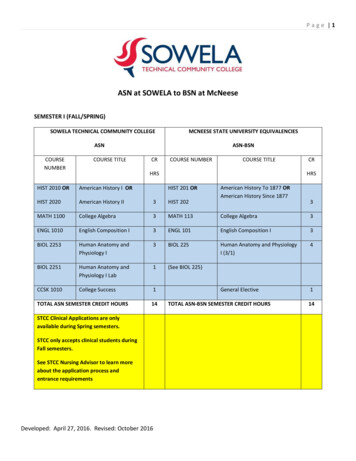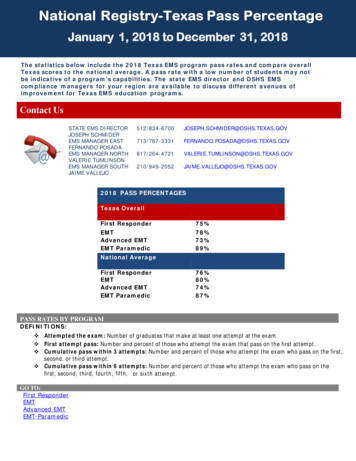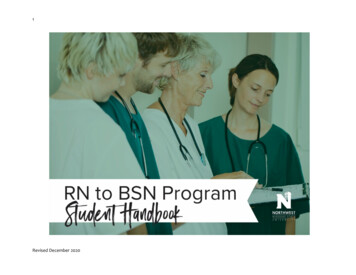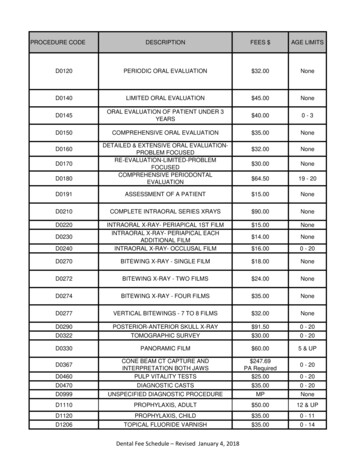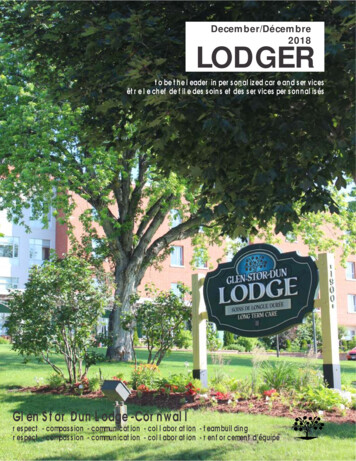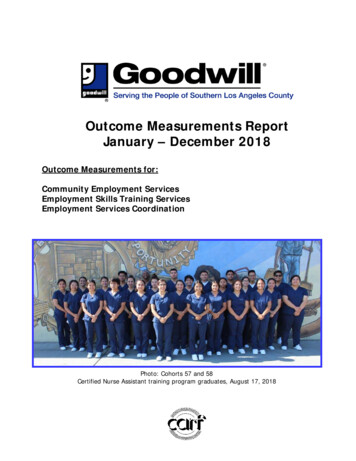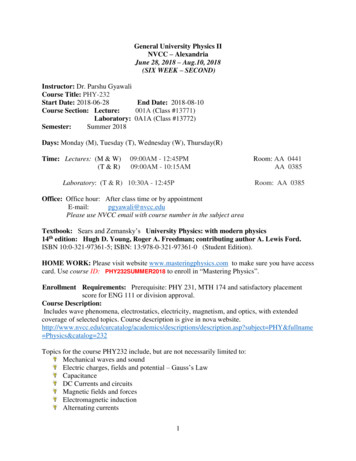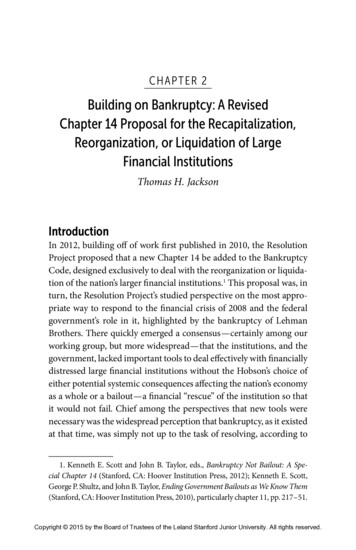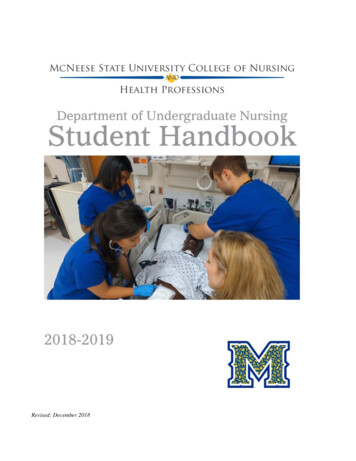
Transcription
Revised: December 2018
Contact Informationwww.mcneese.edu/nursingMcNeese State UniversityCollege of Nursing and Health ProfessionsDepartment of Undergraduate NursingBox 90415 (Mailing address)Lake Charles, LA 70605For information regarding programsor transfering to the College of Nursingand Health Professions, please contact:Student Services CoordinatorSara Dupre337-475-50481-800-622-3352 ext.5048sdupre@mcneese.edu550 East Sale Rd. (Physical address)Lake Charles, LA 70605Undergraduate Nursing Degree ProgramsBachelor of Science (BSN) and LPN to BSN337-475-5821Hardtner Hall, Suite 205Fax : 337-475-5925RN to BSN337-475-5821Hardtner Hall, Suite 205Fax: 337-475-5925DisclaimerThe information in this publication is as accurate as was possible to obtain at the time ofpublication. The provisions are subject to change and do not constitute a contract or an offer tocontract with students enrolled or enrolling at McNeese State University or the College of Nursingand Health Professions (CONHP). Students must take the initiative to ascertain current informationand meet the requirements of the particular program in which they enroll. MSU and the CONHPreserve the right to change or withdraw courses; to change fees, rules and calendar for admission,registration, instruction, and to change other regulations affecting the College of Nursing and HealthProfessions student body at any time.2
The baccalaureate program at McNeese State University College of Nursing and Health Progessionsis accredited by the Commission on Collegiate Nursing Education (CCNE),655 K Street, NW, Suite 750,Washington, DC 20001, (202) 463-6930.www.aacnnursing.org/CCNE3
Table of ContentsIntroductionHistory and Mission . .7Philosophy .8Conceptual Framework .9BSN Level and Terminal Student Learning Outcomes . 10BSN Purposes . 11College of Nursing Community Health Care Center Mission . 11Academic Policies for the Undergraduate Nursing ProgramsAdmission. 11International Students . 12Application Process . 12Clinical Progression Fees . 13Nurse Entrance/Admission Assessment Exam Policy . 13Readmission . 14LPN-BSN and RN-BSN Articulation Plan . 15Transfers . 15Retention-Progression-Dismissal and Appeals . 15-16Withdrawal Policy . 17Intent to Return to Nursing Courses . 17Academic Contract Policy . 18Academic and Clinical Honesty . 19Graduation . 19Attendance Policy: Associate and Baccalaureate ProgramsCredit and Clock Hours . 19Class Attendance Policy . 19-20Clinical Attendance Policy . 20-21Testing, Grading, Academic Integrity Policies: Baccalaureate ProgramsLaptop Requirements .21Academic Integrity .22Theory Evaluation . 22NCLEX Preparation and Mentoring Program . 22Clinical Evaluation . 22Clinical Contract Policy . 23Tracking of Clinical Contracts .23Guidelines for Written Work . 23Proprietorship of Work .23Make Up Test Policy . 24Posting Grades Policy . 24Standardized Testing . 24Faculty/Student CommunicationCommunication to Students of Changes in Policy . 25Instructor Conferences . 25Course Information . 25Student Life: Associate and Baccalaureate ProgramsThe Americans with Disabilities Act . 25-26Diversity Awareness Policy . 26Fire Drill Policy . 26Evacuation Plan . 264
Health Policies . 27-30Physical Examination Requirements . 27Change of Health Status . 27Latex Allergy Policy . 27Blood & Body Fluids Exposure Policy . 27-28Immunizations . 28Health Insurance Verification . 28Tuberculosis Policy . 28-30Student Conduct . 30-42Student Rights and Responsibilities. 30-31Professional Accountability . 31-32Ethics and Confidentiality Policy (including HIPPA) . 32Social Media Policy . 32-34Personal Electronic Devices Policy . 34-35Cameras in the Classroom . 35Substance Abuse Policy . 35-36Student Civility Policy . 36-38Disruptive and Threatening Behavior . 38-39Consent for Release of Student Information . 39-40Problem Resolution Procedure . 40-41Channels for Handling Conflict within the University . 41-42Student Membership on College of Nursing Committees . 42Student Semester Representatives . 42Volunteer Requirements . 42Student Employment . 43Organizations. 43-44McNeese Student Nurses Association . 43BSN Honor Society. 43-44Student Recognition . 44Graduate Awards and Pinning Ceremony. 44Outstanding Student Awards . 44Student ResourcesLearning Resource Center . 44-46Clinical Simulation Laboratory . 46-48Children in the Classroom . 48Clinical PoliciesClinical Safety . 48Dress Code . 48-50AppendicesIdentified Nursing Competencies for the American with Disabilities Act . 51-52Problem Resolution Algorithm . 535
Welcome Students!The College of Nursing and Health Professions nursing administration, faculty, and staff are excitedyou will be joining us in the next phase of your career goals as a nurse. Nurses are consistentlyranked as the most trusting health professional on the health care team. Why? Nurses care aboutpeople and they are willing to listen to their patients when it really matters. You have to want to be anurse and if the answer is “yes”, your opportunities to make a difference in the lives of others andyourself will be limitless. Our alumni are working across the country and the world making adifference every day in both practice and education settings. You can do the same as a graduate ofthis program.The next two and one-half years will require a lot of hard work but it will be worth every minute youspend. I want to thank you for choosing this college and wish you an awesome experience.Remember to stay committed to your studies and stay focused on being the very best that you can andwill be.Sincerely,Dr. Peggy WolfeDean, College of Nursing6
I. INTRODUCTIONHISTORY OF THE COLLEGE OF NURSING AND HEALTH PROFESSIONSIn 1953, political forces in nursing and the health care industry convinced the Louisiana State Board of Educationto approve several regional state-supported colleges as sites for programs in nursing offering the bachelor’s degree.McNeese State College was one of the regional colleges considered. Approximately 10 students were admitted to theCollege of Liberal Arts in anticipation of the establishment of a nursing program in the immediate future. Initial approvalby the Louisiana State Board of Nurse Examiners was given to the program on March 5, 1954. The first class of sixgraduated in May 1957. The college has graduated approximately 3,675 professional nursing students as of the Spring2017 commencement.Other occurrences of historical significance for the nursing program include the initial accreditation by theNational League for Nursing in 1981, and attainment of full college status on June 30, 1983. Also, during 1983, theCollege and three other state-supported programs of nursing petitioned the Louisiana State Board of Regents to grantmaster's degrees in nursing. After evaluation, and with concurrence from the four universities, the Board of Regentsdirected that a consortium for a master's degree in nursing to be given by each university under the auspices of theIntercollegiate Master of Science in Nursing Consortium. In May of 1988, the College of Nursing chartered the Kappa PsiChapter of Sigma Theta Tau International Honor Society for Nursing. Enrollment in the College of Nursing increased over500 percent from 1980-1994. At the same time that Louisiana was experiencing a nursing shortage, health care employerswere increasing their budgets for registered nurses working in their agencies. In 1991, after meeting with health careagency representatives in the service area regarding the nursing shortage, the College agreed to implement two clinicaladmissions per year. Implementation began in fall of 1992, after which a second class was admitted in spring of 1993.Two classes continue to be admitted annually, one each in fall and spring semesters.In 1992, a coalition of health care agencies agreed to fund an Associate Degree program in nursing. In August1993, initial approval was granted by the Louisiana State Board of Nursing. The program admitted the first class in Aprilof 1995. Effective 2011-2012 MSU Catalog, the Associate Degree in Nursing was converted to an Associate of Sciencein Nursing Program. In 2010, the Louisiana Legislature approved the LAGRAD Act that directed the transfer of associatedegree program offerings at four-year schools such as McNeese State University to community colleges. A four-yearphase-out plan was begun Spring 2014 with the last ASN class graduating Fall 2016. On May 27, 2015, the College ofNursing was renamed the College of Nursing and Health Professions following the initiation of a new non-nursing degreeprogram, a Bachelor of Science in Health Systems Management (HSM) (Board of Regents Academic and Student AffairsCommittee Report). In Spring 2016, University administration made the decision to further expand the College of Nursingand Health Professions and moved the Radiologic Sciences and Medical Laboratory Science Programs to the College ofNursing and Health Professions as a department.MISSION OF THE COLLEGE OF NURSING AND HEALTH PROFESSIONSThe mission of the College of Nursing is to prepare health care professional to provide direct or indirect care to meetthe health care needs of individuals, families, populations, or systems. The College supports the University core values ofacademic excellence, student success, university-community alliances, and fiscal responsibility.DEPARTMENT OF UNDERGRADUATE NURSING MISSIONThe mission of the undergraduate nursing degree program is to provide education that will enable graduates to improvethe health care system and the quality of life in global society, value lifelong learning, and enhance the profession ofnursing through a focus on: Clinical Judgment Communication Role Development Professionalism Service to the CommunityFundamental to this mission is the faculty commitment to the University core values: academic excellence, studentsuccess, fiscal responsibility, and university-community alliances.7
DEPARTMENT OF UNDERGRADUATE NURSING STATEMENT OF PHILOSOPHYThe faculty believe:PersonThe person can exist as a unique individual, family, group, community or population possessing dignity, worth, and theright to self-determination. Persons have biological, psychological, sociocultural and spiritual dimensions. As
In 1953, political forces in nursing and the health care industry convinced the Louisiana State Board of Education to approve several regional state-supported colleges as sites for programs in nursing offering the bachelor’s degree. McNeese State College was one of the regional colleges c
